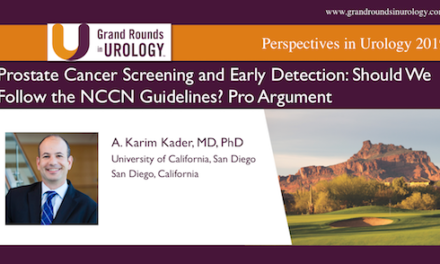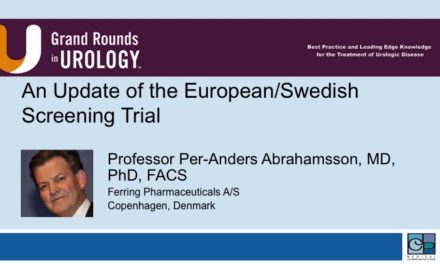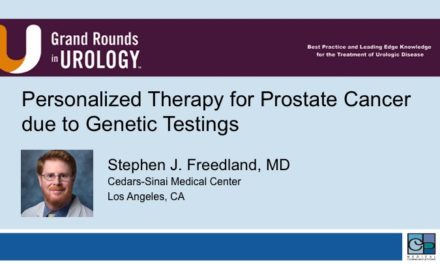Gerald L. Andriole, Jr., MD, presented “Fluciclovine (18F) PET/CT Impact on Clinical Management of Recurrent Prostate Cancer” during the 29th Annual International Prostate Cancer Update on January 25, 2019 in Beaver Creek, Colorado.
How to cite: Andriole, Jr., Gerald L. “Fluciclovine (18F) PET/CT Impact on Clinical Management of Recurrent Prostate Cancer” January 25, 2019. Accessed Nov 2024. https://fluciclovine-18f-pet-ct-impact-on-clinical-management-of-recurrent-prostate-cancer/
Fluciclovine (18F) PET/CT Impact on Clinical Management of Recurrent Prostate Cancer
Gerald L. Andriole, MD, FACS, asserts that the fluciclovine PET-CT scan has a significant impact on the management of patients with biochemically recurrent prostate cancer.
Summary:
Gerald L. Andriole, MD, FACS, asserts that the fluciclovine PET-CT scan has a significant impact on the management of patients with biochemically recurrent prostate cancer. Prostate cancer recurs in up to 40% of patients treated with surgery or radiation therapy for presumed localized disease. Unfortunately, conventional imaging is unlikely to identify the site of recurrence until the Prostate Specific Antigen (PSA) level exceeds 20 mg/mL. Choline PET scans are an improvement over conventional imaging but are not recommended until the PSA level exceeds 20 mg/mL.
Fluciclovine PET scans identify recurrence disease in about 40% of patients with PSA levels less than 0.8 mg/mL, but identifies higher portions of patients as PSA levels rise. In a treatment impact trial of more than 200 men with biochemically recurrent prostate cancer (the LOCATE study), treatment was changed in 59% of patients once the results of the fluciclovine PET scan were known. In 78% of these cases, the treatment changes were considered to be major.
ABOUT THE AUTHOR
Gerald L. Andriole, Jr., MD, is the Robert K. Royce Distinguished Professor and Chief of Urologic Surgery at Barnes-Jewish Hospital, the Siteman Cancer Center, and Washington University School of Medicine in St. Louis, Missouri.
Dr. Andriole received his medical degree from Jefferson Medical College in Philadelphia, Pennsylvania. He trained in surgery at Strong Memorial Hospital and the University of Rochester and completed his Urology Residency at Brigham and Women’s Hospital and Harvard Medical School. Subsequently, he was a Fellow in Urologic Oncology at the National Cancer Institute in Bethesda, Maryland.
Dr. Andriole has over 35 years of consistent contributions in the areas of BPH and prostate cancer screening and prevention research. He has contributed well over 400 peer-reviewed publications and serves on the editorial boards of several prestigious journals. He is Chairman of the Prostate Committee of the National Cancer Institute’s Prostate, Lung, Colorectal and Ovarian (PLCO) Cancer Screening Trial, and PI of the NIDDK Multidisciplinary Approach to Urologic Pelvic Pain (MAPP) and Symptoms of Lower Urinary Tract Dysfunction Research Network (LURN). He was Chairman of the Steering Committee of the REDUCE Prostate Cancer Prevention Trial, as well as PI of both the NIDDK Medical Therapy of Prostatic Symptoms (MTOPS) BPH trial and the NIDDK Complementary and Alternative Medicine for Urinary Symptoms (CAMUS) study. He is a member of the American Urological Association, the American Association for Cancer Research, the American Society of Clinical Oncology, the American Surgical Association, the American Association of Genitourinary Surgeons, and the Clinical Society of Genitourinary Surgeons, among other societies.





